As a Geerling, when a situation goes upside-down I turn to humor. If you need evidence, go read The Joy of Crohn's. Back? Good.
Take today, for example. Day 3 stuck in a hospital due to complications from having Crohn's disease.
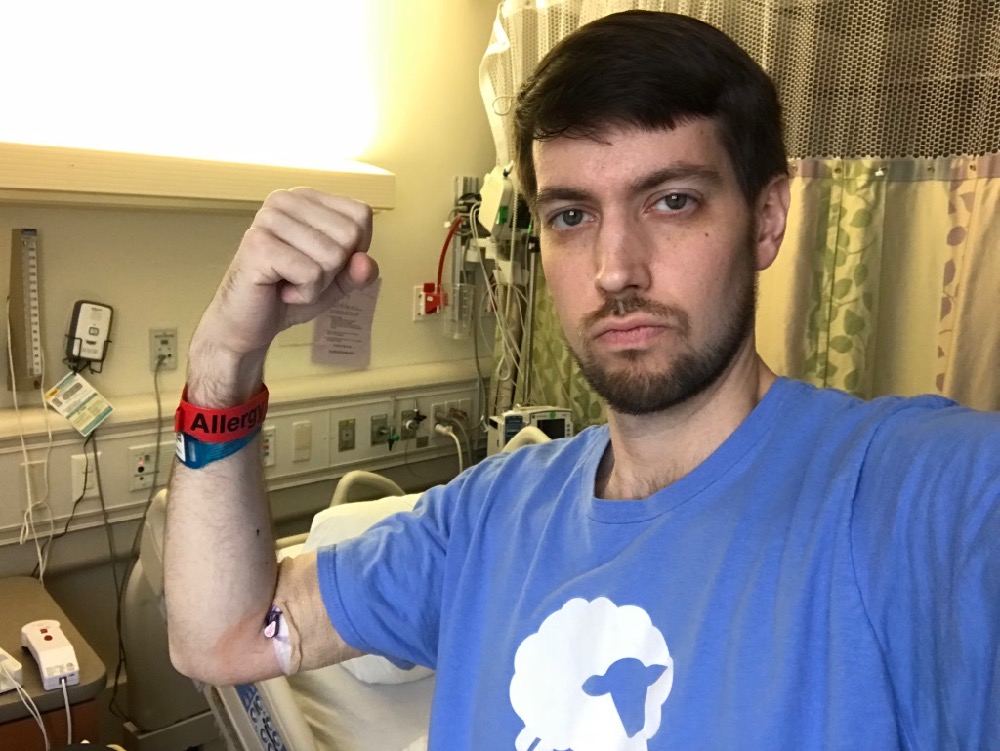
I'm in a bit of an awkward situation: I'm mostly fine, and I can walk around, do most things normally, talk, eat, etc. But I have this one little problem: My poop (due to having Crohn's disease) has gone thermonuclear, and it's now affecting my health.
Apparently I have this thing called CMV Colitis. It's one of a number of ailments that either exclusively affects immunocompromised patients (generally, people with IBD, Crohn's, Lupus, etc.), or makes said patients waaaay worse off than your average person. Like, nearly fatal instead of a low grade fever!
Anyways, picture an average week in a Crohnie's life:
Monday: Get a call from the doctor, in the afternoon:
—Hey, Jeff, can you come in for a Sigmoidoscopy in a few hours? Oh, and did you eat anything recently?
—Yeah, just had lunch.
—Oh, uh... yeah, so you can't have any anesthesia.
—Hmm, so like you just stick things up in my butt and inspect things, and I'm wide awake?
—Yeah, pretty much.
—Okay, let's do this thing ?!
A few hours later, after being probed:
—So yeah, I also want to take like 3 pints of blood, and a few cups of urine for more analysis.
—First my dignity, now my blood? (But in reality:) Sounds great!
Friday: Another call, another afternoon:
—Hey, uh... we got your results. We need you to come to to hospital for an indeterminate amount of time to take a drug that may or may not make you neutropenic1 and might or might not make you better2.
—Oh, okay... when?
—As soon as possible.
—?
And now I'm here today. And after three days here, I'm a little stir crazy, so I'm writing this post. I brought my taxes, but let's be honest, I'm going to hammer those out on April 14 like the rest of you, or maybe file an extension so I can procrastinate a little more. This blog post is much more self-serving and satisfying.
Sights and Sounds
Immediately upon arriving in your hospital room (and even in transit to the room), you'll start to be aware of your environment. For example:
- It's not uncommon to see a large man, butt naked, sitting in his bed, facing you, in his doorway, as you walk or are wheeled past. Door wide open, not an ounce of shame3.
- Invariably, you'll be laying in your hospital bed, reading a book, or just counting down seconds until the next time your vital signs are read. Then it comes: a blood-curdling scream from across the hall followed by a nurse's soothing voice, then a few more seconds of blood-curdling screaming. I like to think whoever did the screaming just got a spinal tap, but more often than not they're sitting on a pinched nerve. Or they have incredibly low pain tolerance and just got labs drawn.
- You're just about to sleep, then you hear a sound like a two-tone vacuum cleaner. Constantly. And then it makes funny beeps. And then you realize your roommate requires a CPAP machine, and it's going to be a hellish night with precious little uninterrupted sleep.
- Speaking of vacuum cleaners—they seem to now be integrated with the hospital bed. And you'd think an airbed would be nice, right? Well, not if it's the Sleep Number from hell! The latest hospital beds will try as hard as they can to keep you awake by making constant psssssssh and hum-whirrrrrrrr sounds as they inflate and deflate chambers in the bed. Also, did you finally find a comfortable sleeping position? Don't worry, the bed will deflate your butt zone then inflate your right leg and flip you over in a minute or two!
- As you walk through the hall, you hear just about every TV show and news personality under the sun—simultaneously. Seemingly 3/4 of the patients on a general hospital floor are of an age where their hearing has gone, therefore their TVs are all turned up all the way. And the cacophony and dissonance of 50 different tinny small TV speakers makes you want to go to the cafeteria and cry. Then you realize the cafeteria also has cheap TVs with tinny speakers turned up way too loud. So you finally consider checking into the mental health floor (do they have TVs?).
- You're just about to sleep, then you hear 'BEEP' ... 'BEEP' ... 'BEEP' ... and it doesn't stop. You press the nurse call button, nurse comes, fixes the occlusion, the teensy bubble of air in the line, or whatever, then she leaves. The moment she's out of earshot, and you're comfy in bed again: ... 'BEEP' ... 'BEEP' ... AAAAAAAAAH!
Nurses
I can't imagine I'd be a good nurse. It seems every nurse has to manage at least 10 patients constantly, and every time I've come to the hospital, nurses have more beepers, phones, and pagers. One nurse had a panic button (which would call for help), a phone connected to patient call buttons, a device that would make beeps when a patient leaned funny in their beds, a separate personal phone for making personal phone calls or browsing Facebook, and finally six pockets full of IV supplies!
I have a hard enough time with a phone that beeps two or three times a day reminding me of meetings, and a watch that yells at me for not taking enough brisk walks4!
Nurses also have to deal with a lot of crap. Literally. Like they have to clean it up, sometimes collect it and distribute it in test tubes... poor nurses! And they have to deal with urine. And blood. And people yelling at them constantly because people are in serious pain and can't take it out on anything or anyone else.
Somehow, nurses seem to make it through the day. At least, I saw the same nurse on a rotation more than one day in a row once, so I'm pretty sure they don't die of exhaustion every day. I'm not sure how.
Doctors
I get it. Doctors and nurses are busy. But has anyone ever had a doctor or nurse give a time estimate for the next time you'd see a doctor and it be anywhere remotely accurate? I'm 'lucky' enough to have multiple teams of doctors working my problems when I come to the hospital since Crohn's complications often involve ID, GI, a nutritionist, the hospitalist, and maybe another specialty or two.
But when you ask your nurse "do you know when Dr. So-and-So will be by?" You either get a noncommittal answer (from honest, battle-hardened nurses), or "I think Dr. So-and-So was making rounds on the floor, should be in the next half hour" (from naïve, but optimistic, nurses).
Or the doctor swings by at 6 a.m. (after you just spent a night trying to sleep through a few dozen BEEPs and a CPAP) and in your groggy half-awake state, asks if you understand all the things he just said. Not really, you think, but if I say yes I might be able to get a few more minutes' sleep before the nurse is back for vitals and more labs...
Food and Drink
Unless you're in the ICU or on TPN, you'll become intimately familiar with the hospital's food service. And if you're ambulatory, maybe the cafeteria, too. But beware the nutritionist! If they swing by, you might end up having one of these hospital delicacies:
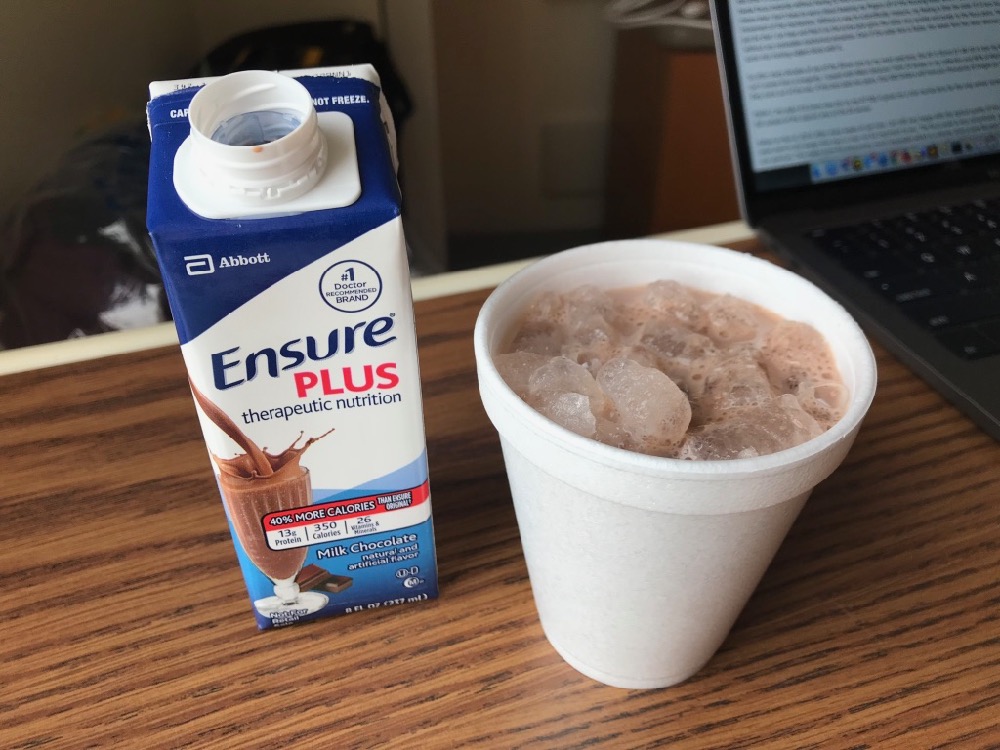
Ensure... on the rocks!
Ensure is loved and hated by anybody who's had dietary issues... the first few times you have it you're tricked into some false belief that it's 'like a milkshake!' But after a dozen or so, you realize your taste buds will need at least a week to recover from the slightly-cardboard taste that perpetually lurks, ready to overpower you the next time you have even the slightest burp.
Luckily, though, I was able to have a regular diet (alongside the Ensures), so the next step in surviving hospital food is finding out which menu items are good. Some things (like the burgers and beef, usually) are the lowest-grade frozen-food service quality. But other things—like a fruit and cheese entree—can be heavenly! (Especially after a couple helpings of Ensure.)
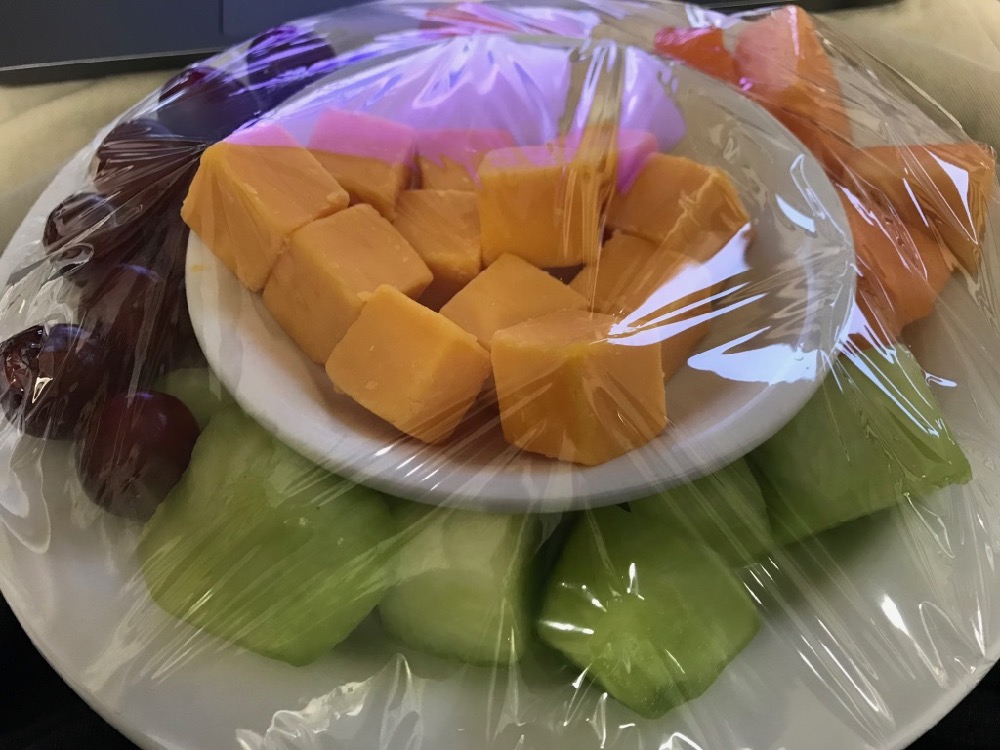
Just be careful not to hit the same entree meal after meal, otherwise you won't appreciate how tasty it is compared to the average plate!
And for some strange reason, Apple and Orange juice always comes frozen in a solid chunk, and there's no sane way to eat or drink the things. So you leave the icee OJ on your tray to thaw, then remember it about four hours later, when it tastes horrible since it's warm...
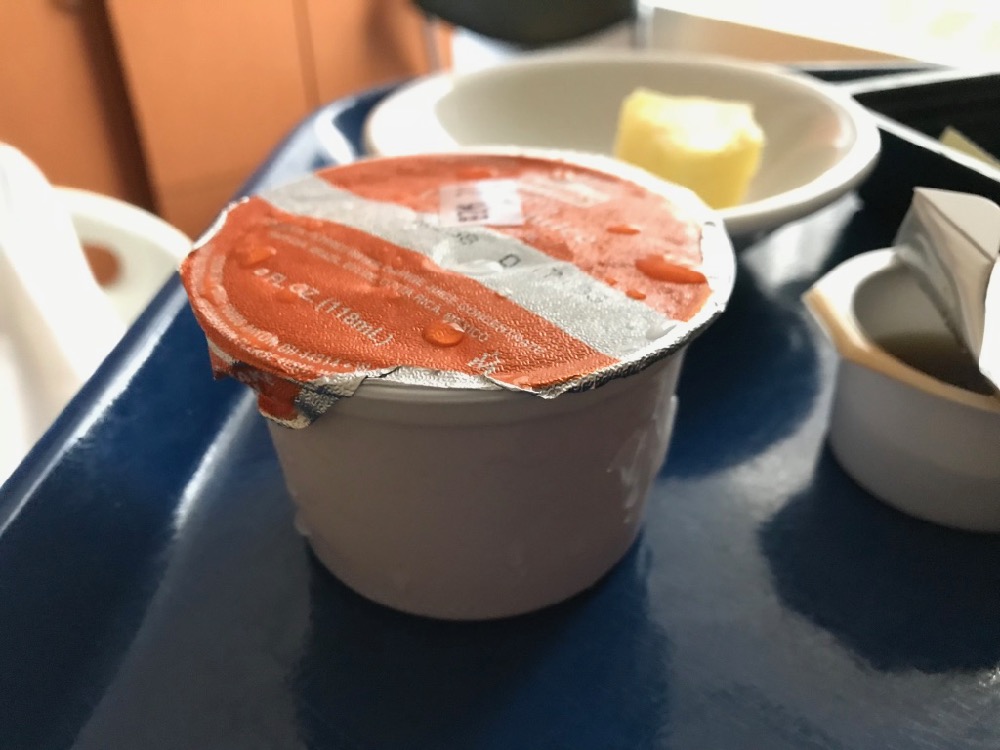
Summary
People with chronic diseases are generally no strangers to hospitals. But even if it's your first time, I hope you have at least the energy to take each challenge standing up—or, more likely, laying down—and count down the minutes until the next meal, or until discharge! Treat your care team well, get to be friends with the nursing and food service staff, and understand that you're not your nurse's only patient, and things will likely go better for you.
Footnotes
1 Basically, even more immunocompromised than you were coming into this thing.
2 Medicine is always a game of statistics. Most drugs and treatments seem to have a 70% chance of working, a 19% chance of fatality, a 10% chance of not doing anything at all, and a 1% chance of turning you into a newt.
3 Shame isn't really something you'll be able to have in a hospital. Well, you can have it, but you quickly learn to bury it, because you're about to be poked, prodded, stuck, flipped, etc.—all while wearing an uncomfortable sheet with a couple holes in it, and a giant opening in the back which seems to want to fly wide open any chance it gets.
4 Seriously, why is my watch so obsessed with me walking so much? I just wanted it to let me make Dick Tracy-style phone calls; since when did watches become nagging fitness coaches?
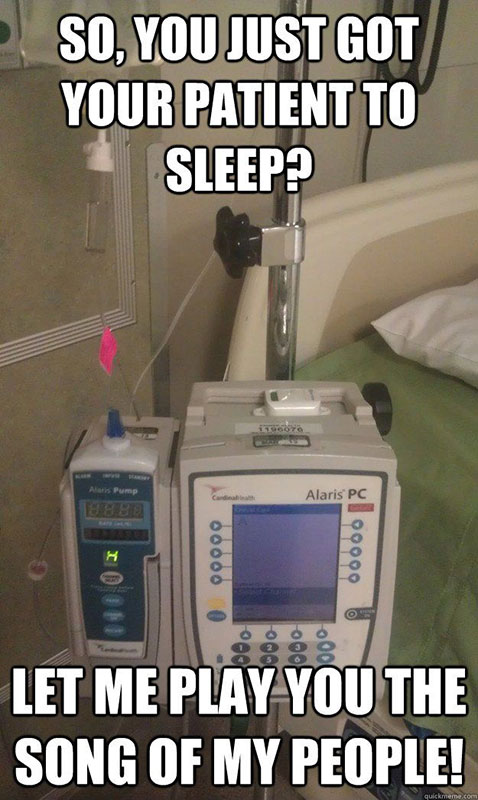
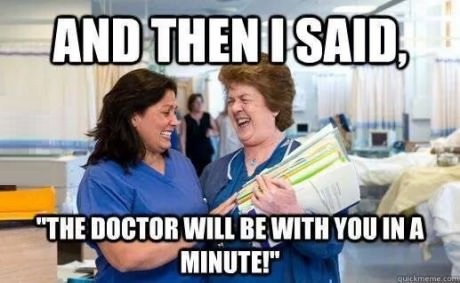
Comments
Hi Jeff,
I also had difficult time with my "version" of this disease - UC. Since non of the meds worked for me (sulfasalazine, corticosteroids, immunosuppressives) I decided for an "alternative". Rather a trial / error than anything planned: paleo diet (cca 6 months): without success, aloe vera cure: without success. Finally, I tried Traditional Chinese medicine (herbs). Don't understand how this works but what's important: in approx. 3 weeks my bowel inflammation was gone (confirmed by colonoscopy). And is still gone for years, now. And without any maintenance meds "to keep me in remission". Should you be interested, I can make you a copy of the herbs that were included (a latin names). Maybe you can discuss this cure with your local TCM practitioner. Best wishes. Petr
Hi Peter,
Could you please let me know which herbs worked for you? I am headed down the surgery path from UC, and may as well try the herbs before going down the chopping block! Thank you very much.